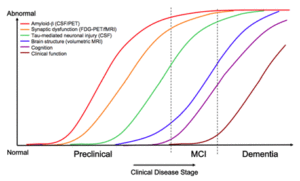Chart: www.re-cognitionhealth.com
**PLEASE read entire article, as it explains the step-by-step development of dementia.**
A newly identified condition — mild behavior impairment (MBI) — may precede the onset of Alzheimer’s before symptoms of memory loss become apparent, according to new research presented Sunday at the conference. [Alzheimer’s Association’s International Conference in Toronto]
Typically, memory loss has been the primary hallmark of Alzheimer’s. However, other signs such as anxiety, confusion and disorientation often become apparent first. MBI defines a set of neuropsychiatric symptoms, acquired in later life and sustained over six months, which doctors can use as a checklist to detect the disease earlier.
The list is made up of five categories of symptoms: apathy, mood, impulse control, social appropriateness and perception.
Research is increasingly showing that if you’re a midlife or older adult and you have a new onset of any of those neuropsychiatric symptoms, then you’re more likely to decline and go on to mild cognitive impairment or dementia,” said Zahinoor Ismail, a specialist in neuropsychiatry at the Hotchkiss Brain Institute at the University of Calgary who presented the new condition at the conference.
Symptoms include sadness, disorientation, panic episodes, aggressiveness or argumentativeness, frustration, stubbornness, hoarding and substance abuse.
Until now, such symptoms have not always been seen as precursors to dementia, resulting in inappropriate treatment…
Source: Above are portions of an article “Complex jobs and social ties appear to help ward off Alzheimer’s, new research shows” by Tara Bahrampour, a staff writer for Washington Post 7.24.1
- * * * * *
Let’s take a look at what this means for families and patients in the dementia world. Most people are familiar with the term Alzheimer’s disease, but may not be sure what MCI (Mild Cognitive Impairment) means let alone MBI (Mild Behavioral Impairment). Below is what researchers and doctors now believe are the steps individuals go through prior to developing dementia and/or Alzheimer’s disease.
Preclinical dementia:
“In a ‘preclinical’ disease stage, key biological changes are under way in the body, but the disease has not yet caused any noticeable ‘clinical’ symptoms. Current scientific evidence suggests that in preclinical Alzheimer’s, brain changes caused by the disease may begin years — or even decades — before symptoms such as memory loss and confusion occur.”
(Source: alz.org)
**DCP ~ Researchers suggest that tangles and plaques (that block nerve impulses) begin to form in the brain 10 – 15 or 20 years prior to any visible symptoms.
Mild Behavioral Impairment:
Symptoms include sadness, disorientation, panic episodes, aggressiveness or argumentativeness, frustration, stubbornness, hoarding and substance abuse.
(**See above article.)
Mild Cognitive Impairment:
“Mild cognitive impairment causes cognitive changes that are serious enough to be noticed by the individuals experiencing them or to other people, but the changes are not severe enough to interfere with daily life or independent function.
Those with MCI have an increased risk of eventually developing Alzheimer’s or another type of dementia. However, not all people with MCI get worse and some eventually get better.”
(Source: alz.org)
Dementia:
“Dementia is not a specific disease. It’s an overall term that describes a wide range of symptoms associated with a decline in memory or other thinking skills severe enough to reduce a person’s ability to perform everyday activities. Alzheimer’s disease accounts for 60 to 80 percent of cases. Vascular dementia, which occurs after a stroke, is the second most common dementia type. But there are many other conditions that can cause symptoms of dementia, including some that are reversible, such as thyroid problems and vitamin deficiencies.”
“While symptoms of dementia can vary greatly, at least two of the following core mental functions must be significantly impaired to be considered dementia:
- Memory
- Communication and language
- Ability to focus and pay attention
- Reasoning and judgment
- Visual perception”
(Source: alz.org)
Forms of Dementia (Including Alzheimer’s Disease):
“Dementia is a general term for loss of memory and other mental abilities severe enough to interfere with daily life. It is caused by physical changes in the brain.
- Alzheimer’s disease
- Vascular dementia
- Dementia with Lewy bodies (DLB)
- Mixed dementia
- Parkinson’s disease
- Frontotemporal dementia
- Creutzfeldt-Jakob disease
- Normal pressure hydrocephalus
- Huntington’s disease
- Wernicke-Korsakoff Syndrome”
(Source: alz.org)
**DCP ~Additional forms of dementia also include, to name a few: TBI – Traumatic Brain Injury; Down Syndrome; Early-onset or Younger Onset Alzheimer’s; CTE – Chronic Traumatic Encephalopathy.
I hope this helps to clarify what the stages of development are in this world of dementia. It’s complicated… frustrating… and overwhelming. But the encouraging point is that with the amount of research and study that is currently taking place, we are getting closer and closer to the answers we are looking for. This discovery of MBI is exciting and a direct result of the research that has been done. The field is being narrowed and pinpointed.


Leave a Reply